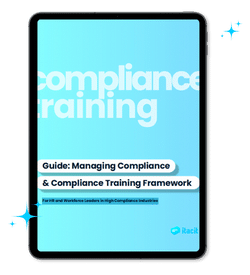Internal employee training has never been so important. The workplace is rapidly changing, urged on by the challenges brought by the COVID-19 pandemic. This makes it imperative to address the skills needed for the jobs of tomorrow: It’s the only way to guarantee employee satisfaction and retention moving forward.
Skilling and upskilling helps workers stay on top of budding trends and remain agile in the labour market, all while promoting a lifelong learning attitude. With many companies moving toward a mostly digital and remote working environment, virtual employee training is becoming the norm.
Collaborative, high quality and easy-to-use compliance training software are the cornerstone of a functional LMS (Learning management system). Now more than ever, investing in tailored and comprehensive end-to-end digital employee training is crucial to the success and evolution of your workplace.
Why Skilling Matters
Skilling is the commitment to provide training to employees. Reskilling and upskilling refer to training that shifts an employee’s focus from one area to another or provides supplementary skills. Skilling must be a focus for all employers looking to create a thriving and sustainable work environment.
Modern employees, especially millennials, are moving between jobs more than ever, and this trend is not likely to change. Retention of talent requires a commitment to growth. Offering training to boost skills, stay on top of trends, and enable professional and personal development is paramount to keeping workers satisfied.
On top of this, rising integration of automation throughout every industry is altering the face of many traditionally human-based jobs. Workplace needs are changing, but there will be a continued emergence of new positions as technology advances. To ensure a sustainable future of work and meet the demands of the jobs of tomorrow, employers and employees must engage in skilling, upskilling, and reskilling.
What Is The Employer’s Responsibility?
An agile workplace – where workers and employers engage in a collaborative commitment to lifelong learning – is best suited to react to difficult challenges. Employers have a responsibility to provide skilling that is productive, high-quality, and accessible to everyone.
Changing demographics in the workforce, along with the unpredictable labour demand of tomorrow, create uncertainties for employers. It’s the employer’s responsibility to ensure that their current workforce can take on new challenges, and grow into roles that may not yet even be identified.
It’s a strange concept for employers to invest in training to prepare workers for future jobs that may not yet exist. The reality is, however, that the rapidly changing landscape of work leaves no room for delay. On the contrary, preparing employees for the jobs of tomorrow should be seen as an obligation.
Delaying employee skilling will leave companies ill-prepared for the future of work, leading to rushed training or – worse – mass layoffs. Companies can avoid re-hiring for the jobs of tomorrow by investing in their current employees and closing the (future) skills-gap. This commitment has a positive effect on worker satisfaction and will produce a highly qualified staff in the long run.
How Can You Implement Skilling, Reskilling, and Upskilling?
Employee training programs have classically been held in-person, either in the office or at an off-site location. Traditional employee development certainly still has its role, but digital training solutions are taking first place. Why? Because they are cost-effective, practical, and give trainees the added bonus of flexibility.
From travel costs, meals, and room rentals, physical training can be costly. Many direct costs can easily be eliminated with a shift to digital learning. On top of that, employees don’t lose precious time by having to block up entire days for travelling and attending training courses. Instead, they can complete training in their own time, either from the office or from home, which also helps to keep their work-life balance in check.
Of course, for certain types of skilling, 100% digital training is not feasible. A hybrid solution – much like many jobs since the COVID-19 pandemic – is entirely possible, and can create a richer, multi-faceted training package.
With workplaces moving more and more online, the opportunity for virtual skilling and upskilling is immense. Across the world, acceptance and interest in digital training solutions has never been higher. Employers who invest in digital employee skilling will be better positioned to tackle the challenges that may arise in the rapidly evolving labour market.
Traceable, adaptable, and easy to update, an LMS skilling solution is the best method to deliver digital training.
Embracing Lifelong Learning
For companies, a commitment to continuous learning is imperative to remain agile and adjust skills to match the jobs of tomorrow. A lifelong learning approach should be a collaborative effort between employers and employees.
Offering easy-to-access, traceable, and relevant training to all employees will benefit every company, as well as the employees throughout their careers.
There’s no one-size-fits-all solution for every employer. However, customizable and adaptable digital training solutions can be seamlessly integrated into an end-to-end workplace communication app. Providing access to employee training on an easily accessible and convenient platform will enable workers to embrace lifelong learning.
With an investment in employee skilling, not only will workers benefit from additional skills, they’ll be more inclined to stay and grow within the company. Skilling and upskilling is a guarantee to boost employee satisfaction, engagement, and retention.


















